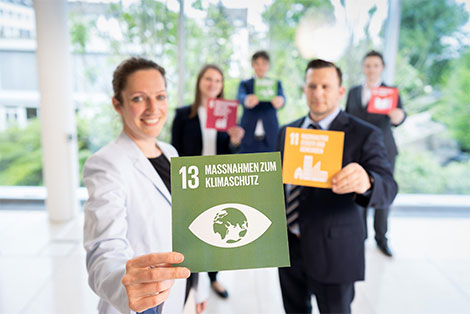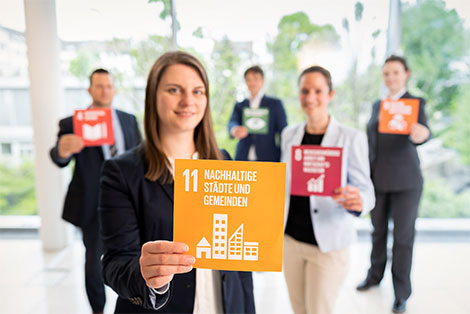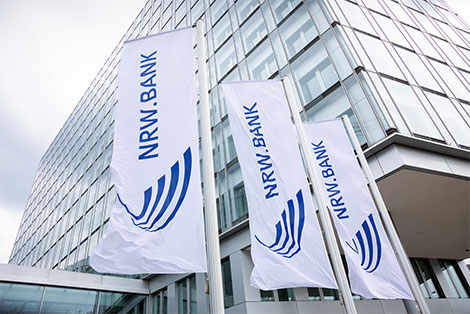NRW.BANK implements the Sustainability Strategy also in its capital market business. Building on its sustainable promotional business, the Bank issues Green Bonds and Social Bonds and enables investors to participate in projects with special environmental and social benefits. The Bank thus generates sustainable income for its investors.
For many years, NRW.BANK has also been pursuing the integration of sustainability into its investment portfolio and is making steady progress in this field.
NRW.BANK Green and Social Bonds
The issue of green bonds has been a fundamental component of NRW.BANK’s refinancing strategy since 2013. Green bonds are used to (re)finance climate-friendly and environmentally-friendly projects in NRW. The green bond programme is based on the ICMA Green Bond Principles (GBP). The Green Bond Framework describes the currently valid framework and supports further development in line with market requirements.
With a view to stepping up the promotion of sustainable projects, NRW.BANK provides its funding recipients with favourable funding on a specially introduced low-interest “green” funding curve – the NRW.BANK.Green Curve. To qualify for the use of the discounted “green” funding curve, the projects to be financed must at least meet the “substantial contribution” criteria in accordance with the EU Taxonomy Regulation. In addition, alignment with the relevant “do no significant harm” (DNSH) criteria as well as the “minimum social safeguards” is expected on a “best-effort” basis.
Since 2020, social bonds have been a further element in NRW.BANK’s capital markets business. The formal framework is provided by the ICMA Social Bond Principles. NRW.BANK uses its social bonds to refinance projects that support the regional economy and affordable housing as well as to secure the liquidity of the municipalities and to help promote education, health and care as well as disaster management.
NRW.BANK Provides Green Financing for Municipalities
Since 2020, NRW.BANK has been offering green financing to North Rhine-Westphalian municipalities to support climate-friendly investments. This green financing is based on the EU taxonomy, which specifies for which investments these subsidised loans may be used. Corresponding loans thus fulfil the selection criteria for refinancing via NRW.BANK.Green Bonds.
In this way, NRW.BANK wants to give the municipalities the possibility to enter the green financing segment and to pass on the interest advantage that has resulted from the higher demand for green capital market products.
Sustainability in the Investment Portfolio
In the context of its capital market business, NRW.BANK pursues a conservative investment strategy to generate necessary surpluses. These are used to finance the promotional business, to secure the viability of the Bank, also with regard to the creation of its own, non-interest-bearing provisions, and to finance the banking operations in accordance with the quantitative budget.
NRW.BANK has taken ESG (environment, social, governance) issues into account in the analysis and decision-making processes for its investment portfolio since 2017 to exclude material ESG risks of the total portfolio and to ensure that the share of the portfolio that has a positive sustainability impact is as high as possible.
The six Principles for Responsible Investment, to which the Bank has formally committed itself since signing the UN PRI in 2020, play an important role in this context.
In accordance with the PRI definition, NRW.BANK relies on a mix of thematic investing, standards-based exclusions, best-in-class and worst-in-class screening and portfolio management aligned with the Paris climate goals to take sustainability into account in its investment portfolio. These elements of portfolio analysis and management are complemented by a collaborative engagement approach. The final achievement of a climate-neutral investment portfolio by no later than 2045 to support the limitation of the temperature rise to 1.5°C is the overarching objective.
Since 2023, NRW.BANK has published its ESG Investment Framework, which specifies and explains the components of ESG integration in the investment portfolio. Alongside the Sustainability Strategy and sustainability reporting, the NRW.BANK.ESG Investment Framework provides additional transparency concerning the objectives and further developments of ESG integration within the investment portfolio. Going forward, the Bank intends to continue pursuing the ESG integration, taking into account the six UN PRI principles.
Collaborative Engagement
Since late 2022, NRW.BANK has pursued collaborative engagement together with other institutional investors via ISS ESG.
In its capacity as service provider, ISS ESG reports extensively on the collaborative engagement activities in its own annual report.
In the reporting year, as part of its collaborative engagement, NRW.BANK participated in 14 engagements of 9 enterprises for which social and environmental controversies were identified with regard to international norms and standards for responsible corporate behaviour.
The engagements in 2024 contributed to achieving SDGs 5, 6, 8, 10, 11, 12, 15 and 16:
NRW.BANK has thus supported a total of 30 enterprises in 50 controversies as part of its collaborative engagement approach:
In this way, NRW.BANK has supported engagements on the following topics:
Participation in collaborative, norm-based engagement since 2022 by topic in %
The Bank will continue to participate in collaborative engagements in the future.
After a months-long test phase in 2024, NRW.BANK decided to also participate in ISS ESG’s thematic Net Zero engagement in the future so as to be able to highlight the importance of climate data and transformation strategies to selected emitters and ultimately make it easier to assess the transformation ambitions of emitters.


 About NRW.BANK
About NRW.BANK



















